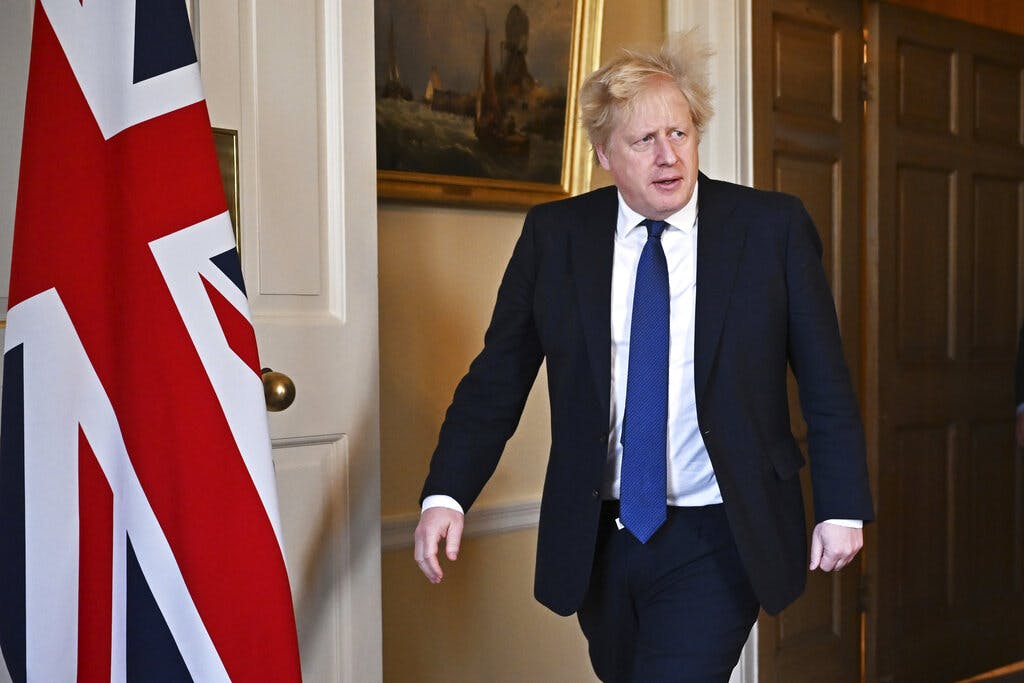Britain’s Johnson Orders Russian Asset Freeze
The sanctions include freezing the assets of all major Russian banks and barring its companies and government from raising money on U.K. markets.

BRUSSELS (AP) — World leaders Thursday condemned Russia’s invasion of Ukraine as “barbaric” and moved to slap unprecedented economic sanctions on the Kremlin.
The West and its allies showed no inclination to send troops into Ukraine and risk a wider European war. But NATO reinforced its member states in Eastern Europe as a precaution against an attack on them, too.
“Make no mistake: We will defend every ally against any attack on every inch of NATO territory,” NATO’s chief, Jens Stoltenberg, said.
In the meantime, the allies began to take steps aimed at isolating Moscow and forcing it to pay so high a price that it changes course.
“Our mission is clear: Diplomatically, politically, economically, and eventually militarily, this hideous and barbaric venture of Vladimir Putin must end in failure,” the British prime minister, Boris Johnson, said.
As the first major world leader to make a big move, he announced a freeze on the assets of all large Russian banks and plans to bar Russian companies and the Kremlin from raising money on British markets.
Britain will also ban the export to Russia of a wide range of high-tech products, including semiconductors, and prohibit the nation’s flagship airline, Aeroflot, from landing at British airports.
The European Commission president, Ursula von der Leyen, threatened to hit Russia with “massive and targeted sanctions.” The European Union scheduled an emergency summit in Brussels, and Ms. von der Leyen said she would put to its leaders late Thursday a proposal that would target strategic sectors of the Russian economy by blocking access to key technologies and markets.
She said the sanctions, if approved, “will weaken Russia’s economic base and its capacity to modernize. And in addition, we will freeze Russian assets in the European Union and stop the access of Russian banks to European financial markets.”
“We want to cut off Russia’s industry from the technologies desperately needed today to build the future,” Ms. von der Leyen said.
In the days before the attack, Germany suspended approval of the Nord Stream 2 gas pipeline from Russia, and the European Union imposed sanctions against hundreds of Russian lawmakers and other officials and institutions from the defense and banking worlds. It also sought to limit Moscow’s access to capital and financial markets.
In a similar bid to fend off an invasion, President Biden announced sanctions over the past few days against Russian banks and oligarchs and warned of even heavier penalties in the event of an attack.
Mr. Biden convened a morning meeting Thursday of his National Security Council to deal with the crisis.
Separately, the U.N. is expected to vote Friday on a resolution condemning Russia and demanding the immediate withdrawal of all its forces. Moscow is certain to veto the measure.
Ms. von der Leyen insisted all Western powers were in lockstep on the crisis. Even Hungary, an often recalcitrant member of the European Union, promptly condemned the attack, raising hopes that the 27 states would quickly achieve the required unanimity for the sanctions package.
Highlighting a widening rift in superpower relations, China stood alone in failing to condemn the attack and instead accused America and its allies of worsening the crisis.
In a clear defense of Moscow, China called for respect for “others’ legitimate security concerns.”
A Foreign Ministry representative, Hua Chunying, said that “all parties should work for peace instead of escalating the tension or hyping up the possibility of war” — language China has consistently used to criticize the West in the crisis.
China went further and approved imports of wheat from Russia, a move that could reduce the impact of Western sanctions. Russia, one of the biggest wheat producers, would be vulnerable if foreign markets were closed off.
The turmoil set off by the attack rippled from Europe to Asia and the U.S. Stocks plunged, oil prices surged, and European aviation officials warned of the danger to civilian aircraft over Ukraine amid the fighting.
Oil prices climbed by more than $5 per barrel. Brent crude briefly jumped above $100 per barrel in London for the first time since 2014 over fears of a disruption of supplies from Russia, the no. 3 producer.
The possible repercussions extended well beyond economics and geopolitics. The director of the Africa Centers for Disease Control and Prevention worried that the crisis will further distract global attention from helping the world’s least vaccinated continent fight Covid-19.
